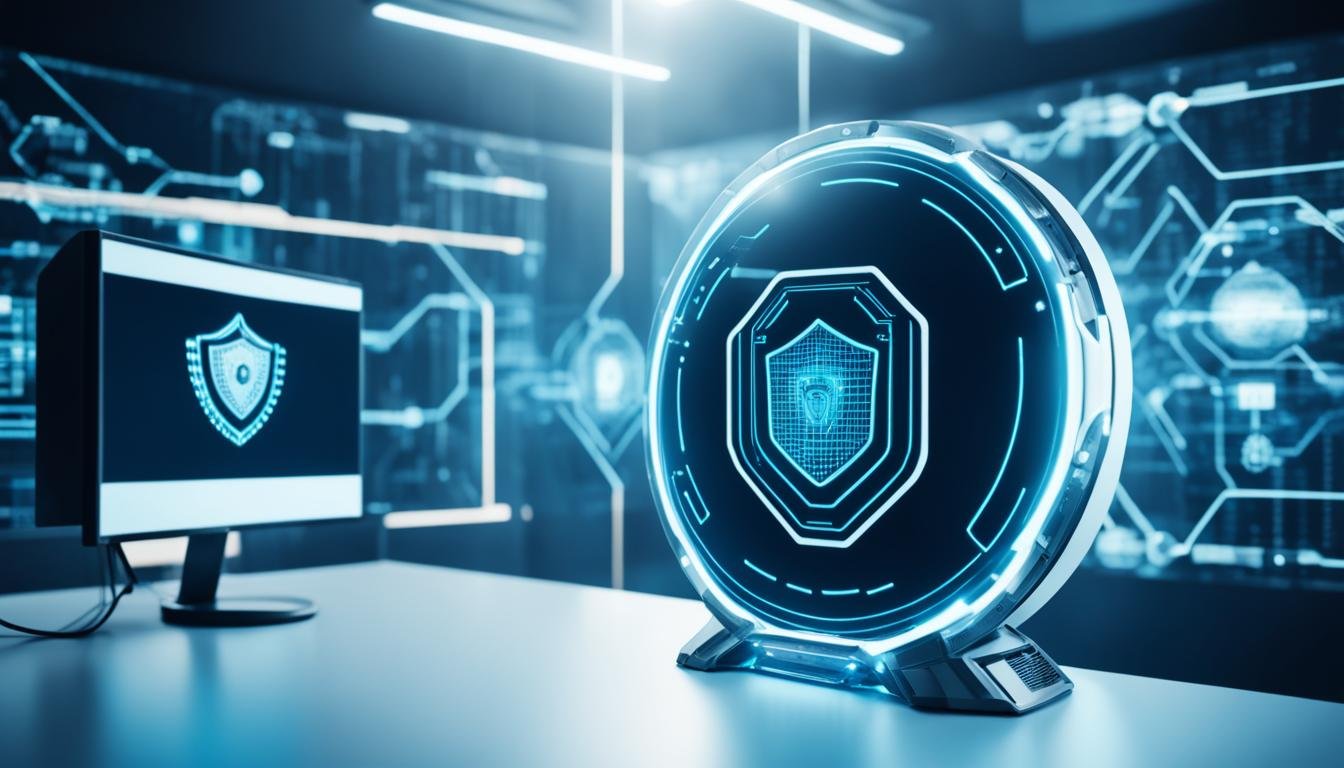The cybercrime rate is soaring, making the need for skilled cybersecurity experts urgent. Since 2016, there has been no unemployment in this field. Cybersecurity Ventures reports over 3.5 million open jobs worldwide. As threats grow, companies are using Artificial Intelligence (AI) to strengthen their defenses. But, the question is, “Will AI replace cybersecurity jobs in the future?”
This article looks at how modern AI is changing cybersecurity. We’ll see the benefits and limits of AI in this field. We’ll also look at the changing job market and new career paths in the industry. By the end, you’ll understand how AI is reshaping cybersecurity and what it means for your career.
Key Takeaways
- The cybercrime rate is skyrocketing, leading to a dire need for skilled cybersecurity professionals.
- AI is enhancing the capabilities of bad actors to perform more sophisticated attacks while empowering cybersecurity professionals to elevate their defenses.
- While AI can automate certain tasks and provide enhanced threat detection, it cannot replace human expertise in cybersecurity.
- New job roles are emerging in the field of AI-powered cybersecurity, such as AI cybersecurity strategist, AI-based malware analyst, and AI security analyst.
- Cybersecurity professionals need to upgrade their skills and learn AI cybersecurity technology to stay competitive in the evolving job market.
What Is Modern AI?
Modern AI means making computer systems that can do tasks that need human smarts. These systems use AI algorithms to learn from big datasets. This lets them make smart choices when asked. AI has many benefits but also has limits we need to know about.
Advantages AI Offers
- Provides quick access to a huge amount of knowledge
- Is more efficient and easy to use than traditional search engines
- Helps professionals by acting as a trusted co-worker
- Makes the protection of systems and processes automatic
Current Limitations of AI
- Lacking human judgment and intuition: AI can’t make complex decisions that need understanding and emotional smarts.
- Reliance on high-quality data: AI needs lots of good data to train and avoid biases, which can be hard to get.
- Need for human validation and domain-specific knowledge: AI often requires human experts to check, improve, and train it with specific knowledge to work well.
As modern AI keeps getting better, it’s key to know its pros and cons. This helps us use it fully while avoiding its risks.
| Advantages of Modern AI | Limitations of Modern AI |
|---|---|
| Vast knowledge base | Lack of human judgment |
| Efficiency and intuitiveness | Reliance on high-quality data |
| Workflow augmentation | Need for human validation and domain expertise |
| Automated protection |
“AI is a powerful tool, but it’s not a silver bullet. Understanding its strengths and limitations is key to using it well.”
Cyber Security Job Market and Career Gap
The cyber security job market is facing a big talent shortage. It needs more skilled people and this need is growing. By 2023, the gap was 4 million people, and it’s expected to get worse, with 3.5 million positions left unfilled by 2025.
This shortage comes from the fast growth of digital technology and the complex cyber threats. These threats are too much for the number of trained people. Companies need experts to keep their systems and data safe from cyber attacks.
Generative AI (GenAI) might change things by making 50% of entry-level cyber security jobs less dependent on specialized education by 2028. This tech could help by making current cyber security workers better and automating some tasks. This lets them focus on more important work.
Cyber security roles are changing too. CISOs are now handling more business tasks and making big decisions. Analysts are moving to manage AI-driven security tech. This is creating new jobs like AI security analysts or Machine Learning Engineers.
To fix the talent shortage, governments and leaders are trying new things. They’re starting programs like the DoD Cyber Service Academy in the U.S. and investing more in cyber security education in India. These efforts aim to bring in and keep skilled workers, making sure the cyber security job market can handle its needs.
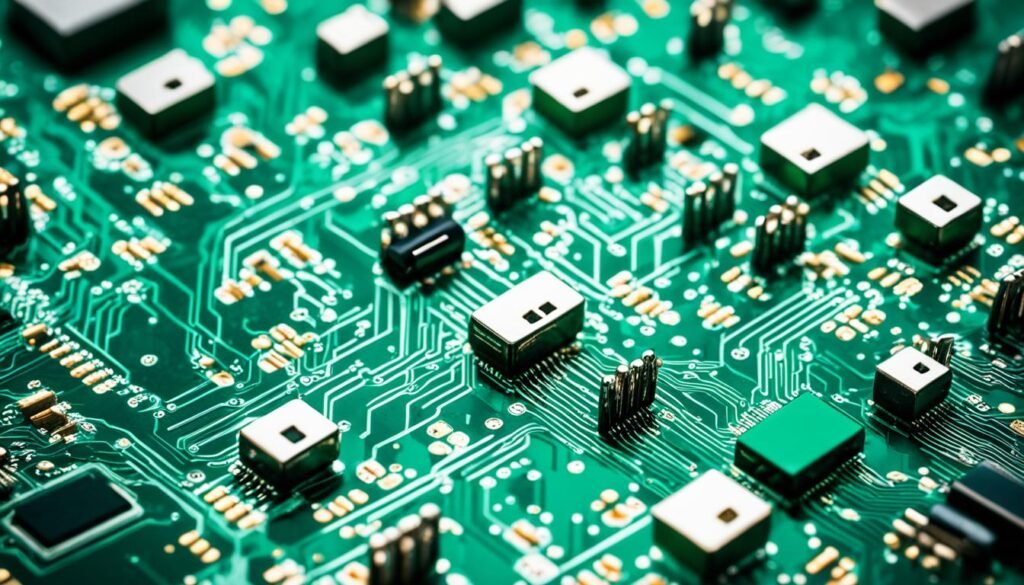
“86% of CISOs agree that AI will help alleviate security skills gaps and talent shortages.”
The cyber security job market and the career gap bring both challenges and chances. With AI and new tech, the need for skilled workers will stay high. This means we need strong plans for developing the workforce and finding new ways to attract and keep talent.
Evolving Role of AI in Cyber Security
Artificial Intelligence (AI) is changing fast in cybersecurity. Both sides, defenders and attackers, use its power. AI helps security teams quickly analyze big data to find threats. At the same time, cybercriminals use AI to make attacks smarter and harder to stop.
AI for Good
Generative AI brings many benefits, like doing tasks faster and automating routine work. It makes cybersecurity teams work more efficiently. AI helps spot threats quickly, catching files and malware that old methods miss.
AI for Bad
But, AI can also be used for bad things. Attackers use it to make phishing emails look real and to pretend to be someone you know. With a shortage of 3.4 million cybersecurity experts worldwide, AI is key to automate tasks and help new team members.
The job market is moving towards needing people skilled in both cybersecurity and AI. Roles like AI security specialists and cybersecurity data scientists are becoming more important. This shows how AI is changing, being both a protector and a potential threat in fighting cyber attacks.
Collaboration or Displacement?
Artificial intelligence (AI) has changed the world of cybersecurity. It brings new chances and warns us of dangers. AI can make cybersecurity better and faster, but it can also be used by hackers. We need to understand how AI affects cybersecurity.
AI Will Improve Efficiency
AI is changing cybersecurity by making tasks faster and more accurate. It looks through lots of data, finds patterns, and acts quickly on threats. This means cybersecurity experts can focus on important tasks instead of routine ones.
This makes organizations save money and work better. AI does the easy jobs, letting people do harder, more important work.
AI Will Be Used as a Tool by Attackers
Cybercriminals are also using AI for their benefit. They use it to make attacks smarter and bigger. With AI, hackers can send out more phishing emails or make fake videos. This makes cybersecurity harder for teams.
AI Will Still Need Human Interaction
Even with AI’s growth, people are still key in cybersecurity. AI can do a lot, but it needs people to check its work and make good choices. Together, AI and people make a strong cybersecurity team. AI can’t replace the skills people have.
AI Will Lead to New Types of Cybersecurity Jobs
AI will also create new jobs in cybersecurity. Jobs like AI security analysts and machine learning security engineers will be in demand. The future will need a mix of tech and security experts working together to fight threats.
AI and cybersecurity have a complex relationship. AI offers chances but also brings challenges. By using AI wisely and knowing its limits, cybersecurity experts can improve their defenses. Finding the right balance between AI and people will shape the future of cybersecurity.
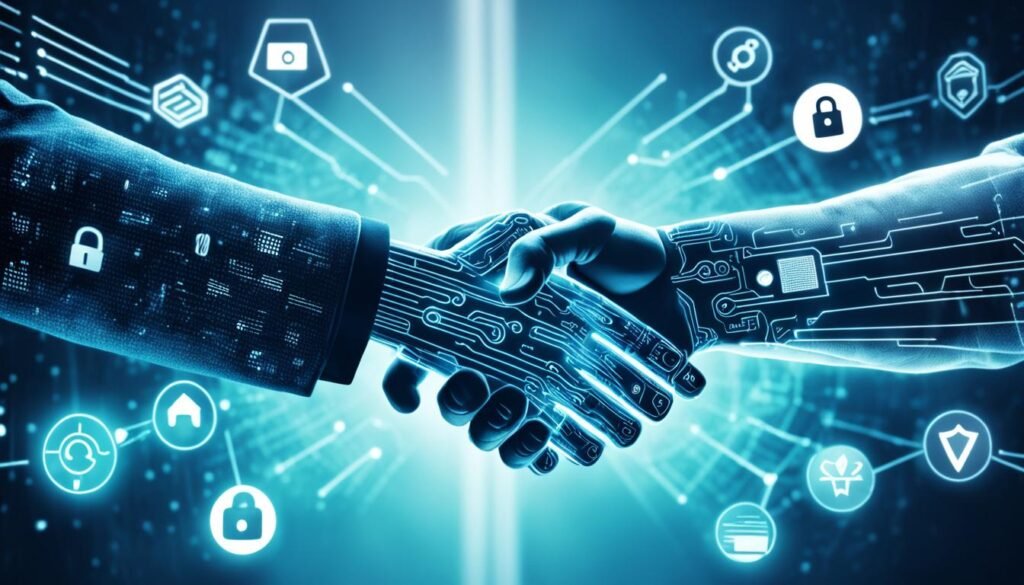
will ai replace cyber security
The debate on whether AI will take over cybersecurity jobs is complex. AI is great at processing data fast, recognizing patterns, and automating tasks. But, human skills like intuition and ethical judgment are still key in cybersecurity.
Experts say AI won’t replace human skills in cybersecurity. Instead, it will work with humans to make them better. AI can help with tasks, but making sense of AI data and making smart decisions still needs human input.
Federal IT leaders believe automation won’t replace human cybersecurity jobs. The Department of Energy says there’s plenty of work for everyone in cybersecurity. The DOE lists four ways AI is used for automation, and the Lawrence Livermore National Laboratory uses it to speed up hardware development and understand sensor data.
But, there are worries about taking humans out of the cyber workforce. Cybersecurity experts stress the need for humans to watch over automated systems. Humans are still needed to understand the context and make ethical decisions.
In conclusion, AI will become more important in cybersecurity, but it won’t replace human skills and judgment. The future of cybersecurity will likely be a team effort. AI and humans will work together to keep us safe from new threats.
AI’s Role in Threat Detection
Artificial intelligence (AI) has changed how we protect our digital assets. It makes AI threat detection, AI malware detection, and AI breach detection much better. This has changed the game in security.
AI Tools for Malware Detection
AI tools use machine learning to spot malware quickly. They learn from new data to catch new malware fast. This means they can stop threats before they cause harm.
Breach Detection through AI-driven Solutions
AI also helps find breaches by watching network traffic and user actions. It spots signs of a breach that others might miss. This lets companies act fast and lessen the damage from attacks.
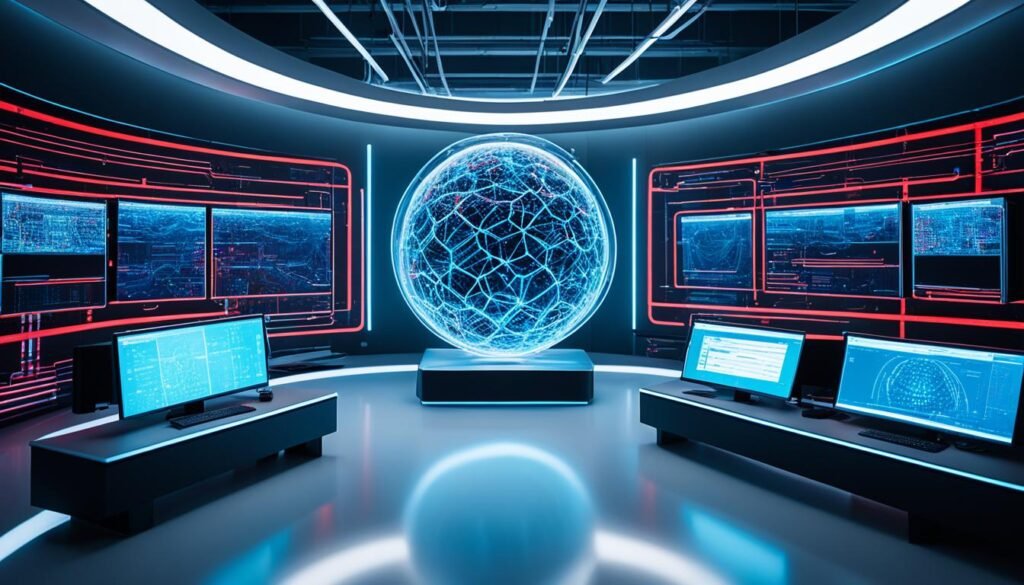
AI has changed how we fight cyber threats. It helps with AI malware detection and AI breach detection. This lets companies stay ahead of cyber threats.
Integrating AI in Incident Response
AI is changing the game in cybersecurity, especially in how we handle incidents. It makes the process faster by automating threat detection and fixing problems. These smart systems can quickly find and stop threats, saving a lot of time.
Addressing False Positives with AI
False positives are a big problem in cybersecurity, making it hard for teams and wasting resources. But AI is changing that. It learns from past incidents to better tell real threats from harmless actions. This makes cybersecurity work better and lets experts focus on important tasks.
Using AI in incident response is key to better cybersecurity. It automates and improves the early stages of responding to threats. This helps stop attacks faster and reduces the damage they cause. Plus, AI cuts down on false positives, making it easier for teams to manage their work.
“AI-powered tools can swiftly identify and respond to cyberthreats in real time, significantly improving the incident response process.”
As cyber threats grow more complex, AI will play an even bigger role in incident response. By using AI, companies can improve their cybersecurity, respond faster, and stay ahead of hackers.
The Role of AI in Cloud Security
In the fast-changing world of cloud computing, AI cloud security is key to protecting cloud resources and data. AI systems watch and check cloud environments as they happen. They spot and act on threats aimed at cloud setups and services.
These AI tools can spot odd access to cloud storage and block unauthorized API calls. They keep data safe while it moves and when it’s stored. AI’s ability to grow and change makes it perfect for the always-changing cloud world. It helps make our digital world safer and stronger.
- AI spots oddities and looks at patterns to find threats quicker and more right than people, boosting security stats like dwell time, MTTD, and MTTR.
- AI automation cuts down the time and effort for dealing with security issues, making the whole process faster from start to fix.
- AI watches how users act in networks to spot odd patterns that could mean security risks, helping catch insider threats or hacked accounts.
AI sorts out vulnerabilities by threat level, looking at exploit chances, affected systems, and how bad a breach could be. This speeds up fixing vulnerabilities. It can also stop phishing attacks by checking emails for suspicious links or odd senders, keeping employees safer.
“AI, machine learning, deep learning, and other automated processes are becoming mainstream in a wide range of operations.”
The use of AI cloud security is changing how organizations protect their cloud assets. It leads to a more active and flexible way to fight cyber threats. As the cloud keeps changing, AI’s role in cloud security will grow more important in keeping our digital future safe.
Can AI Replace Human Expertise in Cybersecurity?
The cybersecurity world says AI is not a replacement for human expertise. It’s a tool that makes human skills better. While some worry AI might take jobs, it’s more likely to help cybersecurity roles.
Understanding AI’s results and making smart choices need human oversight. Relying only on AI for cybersecurity has big risks. These include overdependence on automation, ethical and privacy concerns, the risk of adversarial AI, and the potential for misinterpretation of data.
Potential Threats of AI Replacing Human Expertise
- AI models can be targeted for exploitation and hacking, with attackers injecting malicious training data or backdoors into the algorithms, further underscoring the need for human expertise in monitoring AI behavior for safety and security.
- Deep learning algorithms are prone to a black box problem, indicating a lack of full understanding by AI developers regarding its decision-making processes.
- Overreliance on AI can lead to a false sense of security, potentially causing organizations to overlook the ongoing need for hands-on employee training.
- The evolution of attack vectors demands frequent retraining and updating of AI models, stretching limited security resources.
Collaboration between AI and Human Expertise in Cybersecurity
The best cybersecurity plans use both AI and human skills. They combine AI’s predictive power with human analysts’ deep understanding to anticipate and respond to emerging threats. Human intuition is key in spotting and stopping targeted social engineering attacks, an area where AI falls short.
“AI lacks the ability to build rapport with people or enforce security best practices, emphasizing the necessity for human oversight and intervention in cybersecurity.”
The Future Market of AI in Cybersecurity
The future of cybersecurity is closely tied to Artificial Intelligence (AI). As AI in cybersecurity grows, the AI cybersecurity market will change a lot. It will change how organizations keep their digital assets safe.
Experts say by 2025, AI will be a key part of cybersecurity plans. This will help organizations move from just reacting to attacks to preventing them before they happen. It will also make AI-driven security tools more affordable and accessible to smaller companies.
The “AI Security Copilot” is an exciting idea in the future of AI in cybersecurity. It means AI will help cybersecurity experts do their jobs better. With AI, security teams can make better decisions, automate tasks, and fight threats faster and more accurately.
“82% of IT decision-makers plan to invest in AI-driven cybersecurity in the next two years, with 48% planning to do so before the end of 2023.”
The AI cybersecurity market is growing, and using AI in cybersecurity plans will become more important. Companies that adopt this new technology will be better at handling cyber threats. They will keep their digital assets safe and their operations strong.
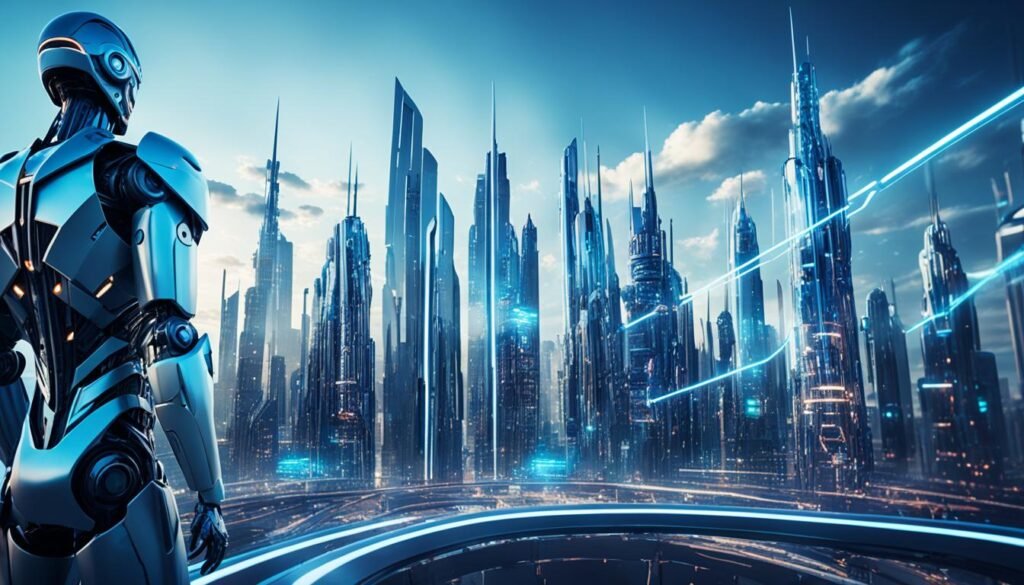
Conclusion
AI’s role in cybersecurity is complex and important. It speeds up processing, recognizes patterns, and automates tasks. But, human skills like intuition, experience, and ethics are still key in fighting cyber threats. AI is a tool that makes you a better cybersecurity pro, not a replacement.
The best cybersecurity plans use both AI and human skills. They combine AI’s predictive power with human analysts’ deep understanding. This way, they can catch and stop new threats. As AI gets better, it will play a bigger part in making our digital world safer.
Working together, AI and human skills will shape the future of cybersecurity. This partnership lets you stay one step ahead of cybercriminals. It helps protect your digital assets. The need for more cybersecurity workers and the rising costs of cybercrime show how important it is to use AI and human skills together.
FAQ
Will AI replace cyber security jobs in the future?
AI won’t replace human skills in cybersecurity. It’s a tool that makes human work better. While it might change some jobs, it will also create new ones. Humans will still be needed to make sense of AI’s findings and make smart decisions.
What are the advantages of modern AI?
AI gives quick access to a lot of knowledge. It’s more efficient and easier to use than traditional search engines. It helps professionals work better, acts as a reliable partner, and automates system protection.
What are the current limitations of AI?
AI can’t replace human judgment and intuition. It needs a lot of good data to work well and avoid bias. Humans must check and improve AI with their specific knowledge.
What is the current state of the cyber security job market?
There’s a big need for skilled cyber workers. By 2025, there could be 3.5 million jobs unfilled because not enough people have the right skills. The need to protect more systems is also growing.
How are attackers and defenders using AI in cyber security?
Both sides use AI for complex attacks and analyzing cyber incidents. It helps security teams protect against advanced threats. But, cybercriminals use AI too, making their attacks smarter and harder to detect.
How will AI impact the efficiency of cyber security professionals?
AI will make cyber workers faster and more efficient. It will reduce the need for people in some jobs and make companies save money. But, it will also help attackers launch bigger attacks.
How will AI impact the future of cyber security jobs?
AI is still being developed and will need human help for a while. It will create new jobs like AI security analysts. As AI gets more common, new cyber security jobs will emerge.
How can AI enhance threat detection capabilities?
AI looks at behaviors and patterns to spot unusual signs of attacks. This helps protect against new threats. It’s also changing how we find malware and detect breaches by using machine learning.
How can AI streamline incident response processes?
AI can quickly isolate affected areas, block bad IP addresses, and start fixing problems. It helps teams focus on the most serious issues by prioritizing incidents.
How does AI play a critical role in cloud security?
AI watches and analyzes cloud systems in real-time. It finds and deals with threats to cloud services and infrastructure. It protects against unauthorized access to cloud storage and data security issues.
What are the potential threats of AI replacing human expertise in cybersecurity?
Relying too much on AI for security has risks. It could lead to over-reliance on automation, ethical issues, and the danger of AI being used against us. There’s also a chance of misinterpreting data.
How can AI and human expertise collaborate in cybersecurity?
The best cybersecurity plans use both AI and human skills. AI’s predictive abilities and human analysts’ deep understanding work together to stop threats before they start.
What is the future market of AI in cybersecurity?
By 2025, AI will be a key part of cybersecurity. It will help companies move from reacting to attacks to preventing them. AI will also make security tools more affordable, helping small companies protect themselves better.
